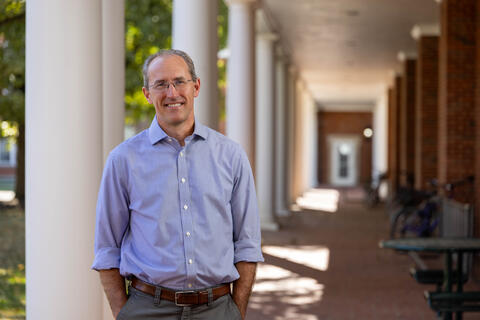Brian C. Clark, Ph.D.

Brian C. Clark, Ph.D.
Brian Clark, PhD is a Professor of Physiology and Neuroscience in the Department of Biomedical Sciences at Ohio University where he also serves as the Executive Director of the Ohio Musculoskeletal and Neurological Institute (OMNI) and is the Harold E. Clybourne, DO Endowed Research Chair.
Brian was raised in Rutherfordton, NC where he graduated from R-S Central High School. He subsequently attended Western Carolina University and graduated with his bachelors degree in Biology. During high school and college he was a highly competitive cross-country and track athlete. His interests in biology and exercise led him to pursue a masters degree in exercise physiology at Syracuse University. Following the completion of his M.S. degree, he continued his graduate studies at Syracuse under the tutelage of Dr. Lori Ploutz-Snyder studying neuromuscular physiology. During his PhD training he also obtained a certificate of advanced study in gerontology. In 2006, he moved to Athens, Ohio to begin his independent research faculty position at Ohio University.
Dr. Clark has held continuous funding since he was a graduate student, and over the past two decades he has secured and managed ~$30M as principal investigator or project director from federal agencies (namely NIH), private foundations, and industry. He has published more than 190 peer-reviewed articles and chapters (total citations >12,000) in high-impact clinical journals (e.g., JAMA Network Open (Impact Factor (IF): 5.1), Geroscience (IF: 6.5), J Gerontology Medical Science (IF: 5.8), Am J Clinical Nutrition (IF: 6.8), Current Opinions in Clinical Nutrition and Metabolic Care (IF: 4.5)) and basic/applied physiology and neuroscience journals (e.g., Aging Research Reviews (IF: 11.8), Acta Physiologica (IF: 4.4), J of Cachexia, Sarcopenia and Muscle (IF: 12.5), J Applied Physiology (IF: 3.1), J Neurophysiology (IF: 2.9), Neurobiology of Aging (IF: 5.2)). He has also been invited to write numerous prestigious review articles and books chapters, such as a chapter for 'Sarcopenia' (Wiley-Blackwell), the first book published specifically on sarcopenia, a chapter for the 7th edition of Hazzard’s Geriatric Medicine and Gerontology (McGraw-Hill), which is largely considered the most complete, authoritative guide available on the diagnosis and treatment of disorders affecting the elderly, and a chapter for the book Regenerative Rehabilitation: From Basic Science to Clinic (American Physiologic Society and Springer-Nature).
According to Suzan et al., two of his articles are ranked in the top 100 articles in the field of sarcopenia (#33 and 53, respectively) (Suzan et al., Eur Ger Med, 12: 185-191, 2021). According to Ioannidis et al., based on career-long citation metrics he is ranked in the 98.8th percentile of scientists in his discipline, and was in the 99.5th percentile based on citation metrics from 2019 (Ioannidis et al, PLoS Biology, 2019). He has served on more than 60 federal grant review panels, and has served on numerous expert boards (e.g., Global Leadership Initiative in Sarcopenia (GLIS) Steering Committee), has delivered dozens of major national and international lectures and keynotes, and has received major national and international awards (e.g., 2010 New Investigator Award from the American College of Sports Medicine).
He has served as the Executive Director of the Ohio Musculoskeletal and Neurological Institute (OMNI) at Ohio University since 2008. Shortly after taking the helm of OMNI he undertook a strategic visioning process that transformed the institute into what it is today: a cadre of collaborating scientists who have internationally renowned research programs exerting strong and sustained influence on the fields of i) aging systems, ii) injury, pain, and rehabilitation. Under Dr. Clark's leadership, OMNI exhibited exponential growth in its publication rate (>10-fold increase) and extramural grant funding (>50-fold increase). Today, OMNI is consistently one of the most productive research institutes at Ohio University (current funding is equivalent of ~ 11 NIH R01's), seven of its investigators have been ranked in the top 2 percent of their respective fields, and its scientists have published more than 1,700 articles. In the fall of 2022, the OHIO Board of Trustees approved the creation of two new centers, the Injury and Pain Research Center and the Center for Healthy Aging, both housed within OMNI.
In addition to his administrative/service roles, Brian has been actively engaged in entrepreneurial activities both as an individual scientist as well as a research administrator. The most notable of these achievements is the creation of a MedTech start-up (OsteoDx, Inc.) that is currently working to commercialize their Cortical Bone Mechanics Technology. He also serves as an educator as well as a mentor to, and an advocate for, the graduate students and post-doctoral trainees. To that end, he has held significant medical education roles and responsibilities where he received teaching awards and served as a Founding Member of the Translational Biomedical Sciences PhD program at Ohio University for a decade. In addition, he has trained over a dozen graduate students and postdoctoral candidates. Lastly, he works closely with numerous local aging-related community organizations.
He lives with his wife, Leatha, in the hills around Athens, OH. In his free time he enjoys hiking, power yoga, other forms exercise, gardening, and birding.
